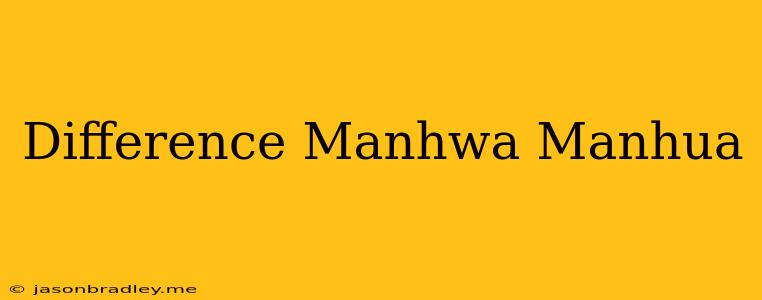Manhwa vs. Manhua: What's the Difference?
The world of comics is vast and diverse, with different styles and origins captivating readers worldwide. But sometimes, it can be hard to tell the difference between similar-looking titles. This is especially true when it comes to manhwa and manhua, two popular genres of comics with distinct roots and characteristics.
What is Manhwa?
Manhwa refers to comics originating from South Korea. Known for its diverse range of genres, including action, romance, fantasy, and drama, manhwa often boasts detailed and expressive art styles that capture emotion and dynamic action sequences. Some popular examples of manhwa include "Tower of God," "Solo Leveling," and "The Gamer."
Key features of manhwa:
- Reading direction: Right to left, similar to traditional Japanese manga.
- Art style: Characteristically vibrant and detailed, with a focus on expressive faces and dynamic poses.
- Genres: Encompasses a wide range of genres, often featuring mature themes.
- Target audience: Typically caters to a wider age range, with titles appealing to both younger and older audiences.
What is Manhua?
Manhua refers to comics originating from China. Manhua is known for its rich history and diverse storytelling that often draws inspiration from traditional Chinese mythology and folklore. Its art style can vary depending on the genre, but generally leans towards realistic portrayals and detailed backgrounds. Some popular examples of manhua include "The King's Avatar," "Martial Peak," and "The Great Ruler."
Key features of manhua:
- Reading direction: Left to right, similar to Western comics.
- Art style: Can vary widely depending on the genre, but often incorporates realistic details and traditional Chinese elements.
- Genres: Often includes historical fiction, fantasy, and martial arts genres.
- Target audience: Typically caters to a broader audience, ranging from children to adults.
Key Differences Between Manhwa and Manhua
While both manhwa and manhua share common characteristics as comics, there are some key differences that set them apart:
- Origin: Manhwa is from South Korea, while Manhua is from China.
- Reading direction: Manhwa is read right to left, while Manhua is read left to right.
- Art style: Manhwa typically features more vibrant and expressive art styles, while Manhua often leans towards realistic portrayals with detailed backgrounds.
- Genres: Manhwa often features a wider range of genres, including mature themes, while Manhua tends to focus on historical fiction, fantasy, and martial arts.
Final Thoughts
Whether you're a seasoned comic reader or just starting to explore the world of visual storytelling, understanding the differences between manhwa and manhua can enhance your reading experience. By recognizing their unique origins, art styles, and storytelling traditions, you can better appreciate the diverse tapestry of comics that these two genres offer.
